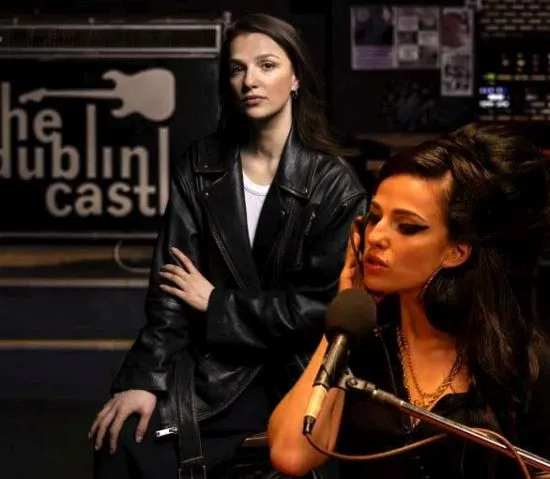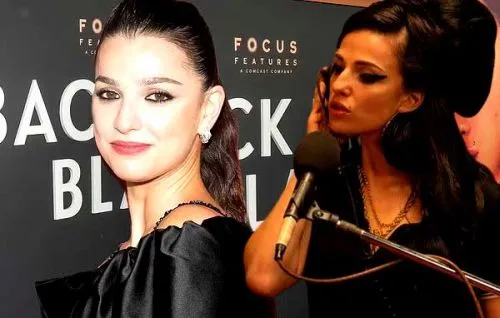Chasing Amy
Marisa Abela’s friends have attempted to coax her into performing Amy Winehouse tunes at karaoke, but their efforts have been futile.
You can witness her embodying Winehouse on screen in the new movie “Back to Black,” set to premiere in the U.S. this Friday.
Abela, renowned for her role in the TV series “Industry,” aimed for her portrayal not to mimic the legendary British singer merely. She dedicated four months to mastering Amy Winehouse’s distinct vocal style (two hours daily, five days weekly), guitar playing (one hour daily, three times weekly), and replicating her movements through rigorous physical training.
Abela delved deeply into Amy Winehouse’s world and music until she found it somewhat overwhelming. To spare her flatmates from the constant noise of her guitar practice (“initially, everything sounded dreadful”) and endless repeats of performances, she opted to move to Camden.
Northern London
It’s the neighbourhood in northern London where Winehouse resided and passed away, remaining cherished and commemorated to this day. Her presence, both in image and music, permeates the surroundings.
Abela recalls how Winehouse frequented pubs and restaurants, sometimes singing unexpectedly and other times when it was entirely appropriate.
Directed by Sam Taylor-Johnson, “Back to Black” chronicles the journey that inspired Amy Winehouse’s iconic album of the same name. It portrays her ascent to stardom from her initial album “Frank” to her Grammy success in 2008. Beyond her musical career, the film delves into her intimate Friday night family gatherings and the emotional turbulence of her relationship with Blake Fielder-Civil, portrayed by Jack O’Connell.

Now 27, Abela was Winehouse’s age when she passed away in 2011. The actor recently sat down with The Associated Press at The Dublin Castle, a renowned pub and music venue in Camden. This location holds significance as a beloved spot frequented by Winehouse and also serves as a filming location for “Back to Black.”
It meant a lot to her to remain in Camden,” Abela reflects. “The stories shared by everyone here have been incredibly valuable.
The actor recalls stopping by for a pint after securing the role simply to soak in the atmosphere. Winehouse often performed gigs there and would occasionally step behind the bar to serve drinks. Signed photos of her adorn the walls, proudly displayed by landlady Peggy Conlon (though they had to be taken down during filming)
Abela explains how the authenticity of the venues, with their tabletops and sticky floors that Winehouse herself walked on, added depth to the scenes where extras stood holding mock drinks.
Readmore Biden’s graduation speech in Morehouse College divided over
Abela reflects on the remarkable histories of these venues, especially the music spots where Winehouse performed and made her mark.
Filming a movie about Winehouse in Camden presents a challenge: there’s no escaping the public eye in this vibrant neighbourhood.
Abela found herself captured by the paparazzi, reminiscent of Winehouse, strolling in the rain with red lipstick, teased black hair, and ballet slippers, often barefoot. However, when it was time, she fully embraced the towering stilettos that the singer famously wore during her performances.
Concerns Safety
Those heels are absolutely wild,” Abela remarks. “She indeed managed to stay steady in those heels, especially with that hair— it’s no light load. It’s quite a weight on your head.
During a scene reenacting Winehouse’s 2008 Glastonbury performance, the actor was suggested to wear sneakers when her feet weren’t visible for safety concerns.
But wearing trainers significantly alters your physicality like you’re ready to run. So, I’ll stick with the heels, thank you,” Abela concluded.
Taylor-Johnson engaged with Winehouse’s family, though they didn’t have any influence on the film’s artistic direction. The script was crafted by Matt Greenhalgh, known for biographical films like “Control” (2007) about Joy Division’s Ian Curtis and “Nowhere Boy” (2009) about John Lennon. Taylor-Johnson, a devoted Winehouse admirer, expressed that she recognized Abela’s ability to evoke the essence of Amy early on in the audition process.
Amy Winehouse
Abela invested “blood, sweat, and tears” into the role because she understood firsthand the profound impact Winehouse had on people.
Raised in a Jewish family in a small village near Brighton on England’s south coast, Abela attended a Church of England school and had limited interactions with other Jewish individuals.
“I didn’t see many women confidently rocking the Star of David like Amy Winehouse did. Seeing her embrace her identity was incredibly inspiring,” Abela reminisces.
“Back to Black” dominated the box office in the U.K. and Ireland upon its recent release, claiming the top spot twice. While Abela refrains from reading reviews, she acknowledges that the idea of what Winehouse would think of her portrayal troubled her. Eventually, she found solace in the belief that the singer would, at the very least, appreciate the dedication she poured into her performance.
Abela was adamant about singing authentically, aiming to “unlock” Amy Winehouse’s essence through her performance. However, she currently has no intentions of leveraging her singing skills for personal gain.




